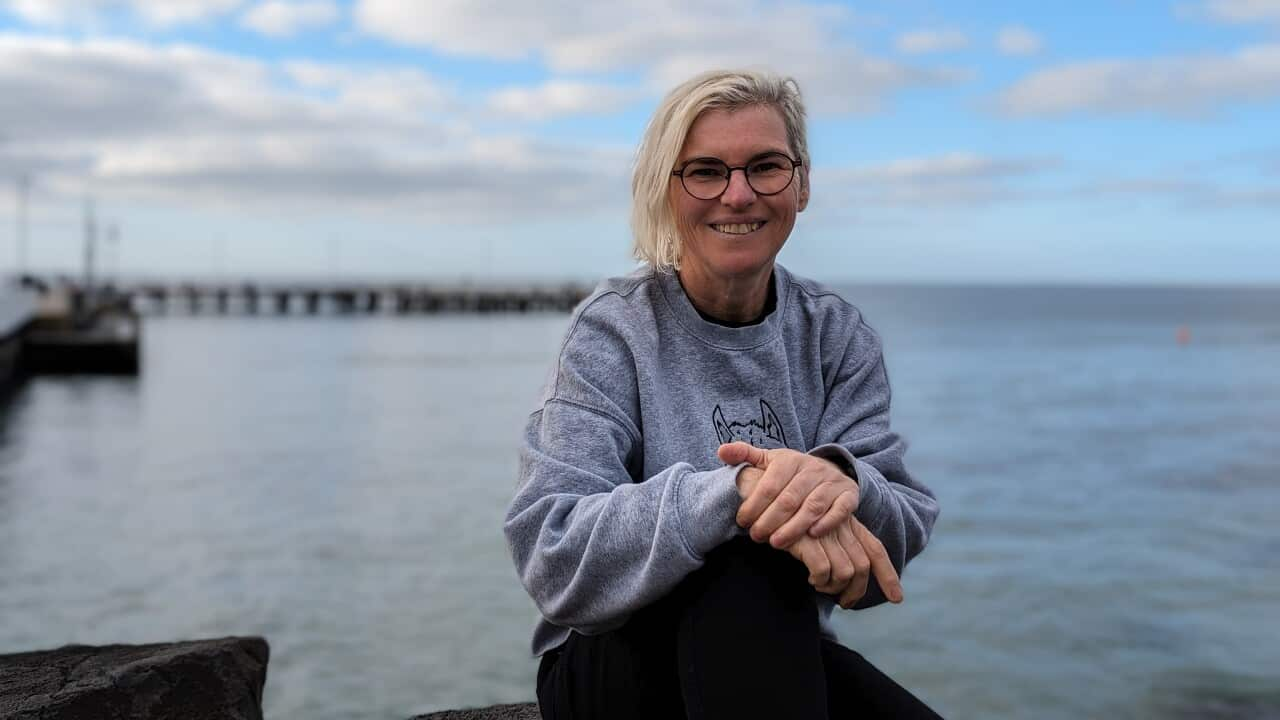This article contains references to domestic violence.
Surrounded by 300 people, Zahra Abrahimzadeh should have been safe. But that's when her husband decided to kill her.
The crowd had come together to celebrate Persian New Year in Adelaide in 2010. Zahra had fled her abusive husband only weeks earlier, after he had threatened to kill her and burn their house down, with her and their three children inside.
Her son Arman, now an anti-domestic violence campaigner, remembers receiving the call in which he was told that his mother was gone.
"The other person on the other side of the phone essentially told me to come down to the convention centre because your dad has just stabbed your mum," Arman told SBS News.
When they'd escaped the family home, his mother had taken out what was then known as a restraining order against her husband.
The measure is now known as intervention orders.
But despite the protective order, Zahra had received vague threats from her ex, and the family had been harassed and followed by extended family members.

Arman (left) lost his mum, Zahra Abrahimzadeh, to domestic violence 14 years ago. Source: Supplied / Caroline Riches
"But that sense of safety went away after a number of breaches," he said.
"We reported those incidents to the police. Their response was, 'This is not a threat, and unfortunately we don't see this as a breach in the restraining order'."
A few days before Zahra was killed her husband successfully had the restraining order modified, allowing him to attend cultural and religious functions.
Arman, along with other victims, survivors and law experts, now advocates for .

With national attention on the issue of domestic violence, there's renewed pressure for reforms to keep women safe. Source: AAP
What are protection orders?
Every state and territory in Australia has a system of , said Rosalind Dixon, a law professor at the University of New South Wales.
While the names vary across Australia — apprehended violence orders (AVO), intervention orders, domestic violence orders, and family violence restraining orders — they work the same in principle, forcing perpetrators of violence to "cease and desist" their actions, she said.

"If the orders are breached, there are criminal consequences … And that is meant to be a really clear message that this is not wanted and it's not acceptable and a breach will not be tolerated."
'Just a piece of paper'
Sally* says having an AVO made no difference to her safety. Survivors who speak out risk being sued for defamation, so we’ve concealed her identity.
Following a brief honeymoon phase with her former partner, their relationship soured and she endured constant threats, yelling, restrictions on friendships, financial abuse and other controlling behaviour.
A few months after their son was born, police helped remove her partner from her home, but the abuse continued.
"It didn't take me long to learn that the AVO was just a piece of paper and it didn't do anything and it didn't stop anything. And there were absolutely no consequences for any of his behaviour," the mother-of-two told SBS News.
The order specified he couldn't harass, intimidate, threaten or stalk her, or see her within 12 hours of drinking alcohol. But he could still contact her, to see his son.
It didn't take me long to learn that the AVO was just a piece of paper and it didn't do anything.Sally*
Soon that contact morphed into showing up to her house unannounced, demanding to be let in, or threatening her via calls and messages, sometimes in the middle of the night while their son was asleep.
She reported these breaches of the AVO to the police multiple times, she says.
"Responses were kind of always just, 'There's really nothing that we can do about it, he's just trying to see his son'."
Any hope that the AVO would stop her ex quickly diminished and she began to see reporting breaches to the police as a "waste of time".
Eventually, she secured a strict no-contact order.
Sally believes reform is necessary, including harsher penalties to ensure perpetrators are forced to recognise and stop their behaviour.
Vastly varying penalties
Research into protective orders is limited but there are studies that suggest most are effective.
Data from the NSW Bureau of Crime Statistics and Research in 2016 shows 20 per cent of AVO final orders were breached. In around two-thirds (64 per cent) of those instances, there was only a single breach.
Criminal charges can include a prison sentence ranging from 12 months to five years depending on the state or territory — as well as fines of vastly varying amounts.

Source: SBS News
However, states and territories should "learn from each other and look at reform in light of success or challenges of other states", she added.
She said Victoria's increased penalties for repeated offences — a hefty $115,000 fine — should be cause for debate about change in NSW, where the maximum fine is a much lower $5,500.
How do you get a protective order and what are their limitations?
Short-term or emergency orders can be granted by senior police officers when they deem someone to be at immediate risk, Dixon said.
However, more commonly women have to go to a police station, then to court and request an order from the magistrate, proving on a balance of probabilities that there is a reasonable risk of harm.
Family violence specialist Abbey Newman is critical of this process, both for the initial intervention order and for reporting a breach.
"You can't really control how trauma-informed a police officer is and their ability to have these really sensitive conversations," she told SBS News.

Law experts and campaigners are calling for more stringent enforcement of restraining orders. Source: Getty / Images
Newman, who gave evidence at the 2016 Victorian Family Violence Royal Commission, said family violence courts were overworked and had lost the capacity to "meaningfully engage", often assessing very nuanced family dynamics in a limited span of time.
Other limitations included difficulty in proving breaches, lag times in enforcing them and delays in cases being heard, with parts of the process re-traumatising victims.
What kind of reform is needed?
Newman said a therapeutic system of reporting would be more accessible, especially for or those who struggle to explain their circumstances with limited English.
She said the upskilling of therapists to compile statements would lead to more trauma-informed assessments, more trust in the process, and "much better outcomes".
Dixon added that, while protective orders were "critically important", they were only part of a vast toolkit to tackle family violence, which included many educational, psychological and mental health measures.
The murder of women where the risk of violence was known and preventable is "completely unacceptable", she said.
The law expert argues reform should be focused on repeated breaches, to deter people from "losing faith" in offering them protection.
"I would like to see tightening up bail for those who are repeat breach offenders and also subjecting people who are high risk either because of an earlier profile or because of breaches to GPS monitoring," she said.
Fourteen years on from Zahra's death, some protection orders have improved, but Arman is calling for more stringent enforcement.
"What we need now is for the legislative framework around intervention orders to be strict and tight, so where victim survivors do experience breaches of those orders, that there are consequences for those perpetrators," he said.
If you or someone you know is impacted by family and domestic violence or sexual assault call 1800RESPECT on 1800 737 732 or visit . In an emergency, call 000.
, operated by No to Violence, can be contacted on 1300 766 491.













